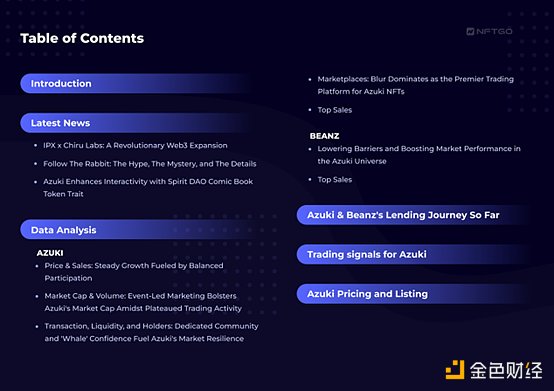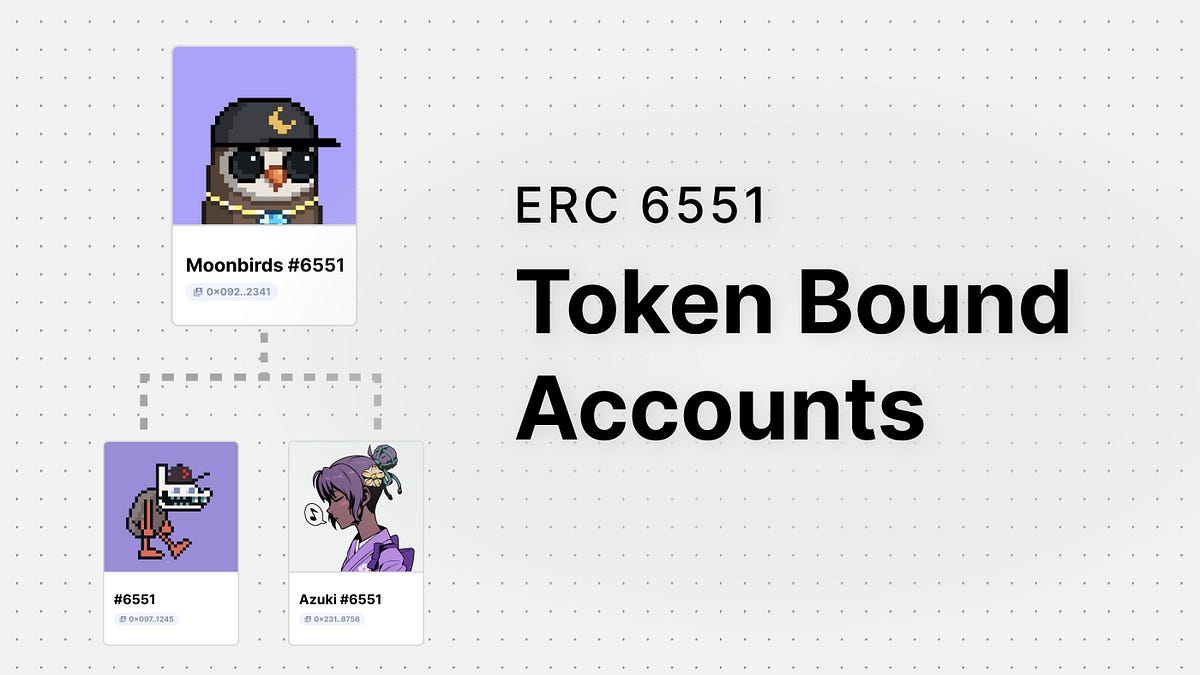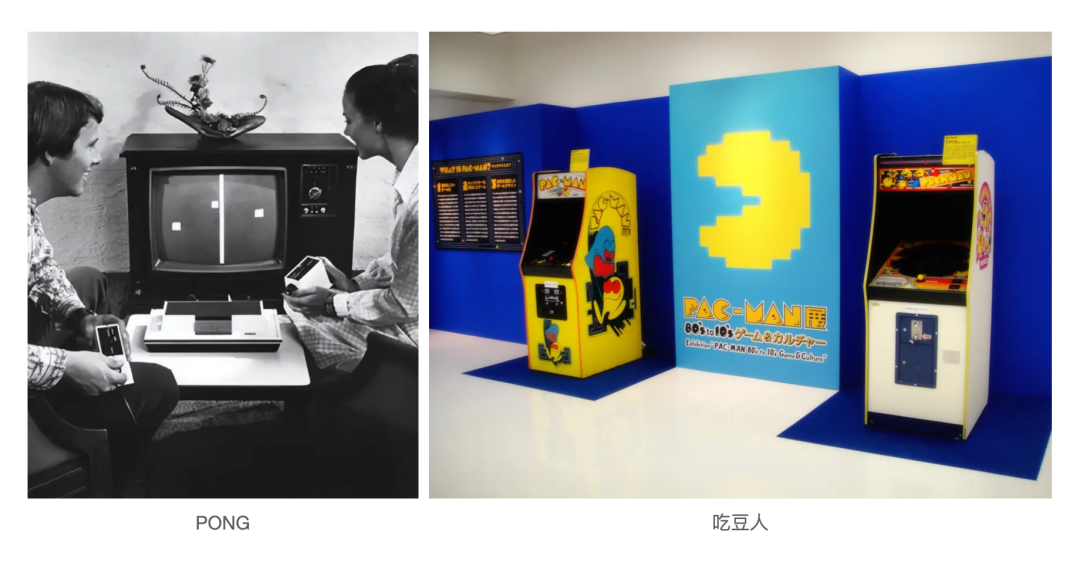Listed Company Topics | The Way of Huobi Holding
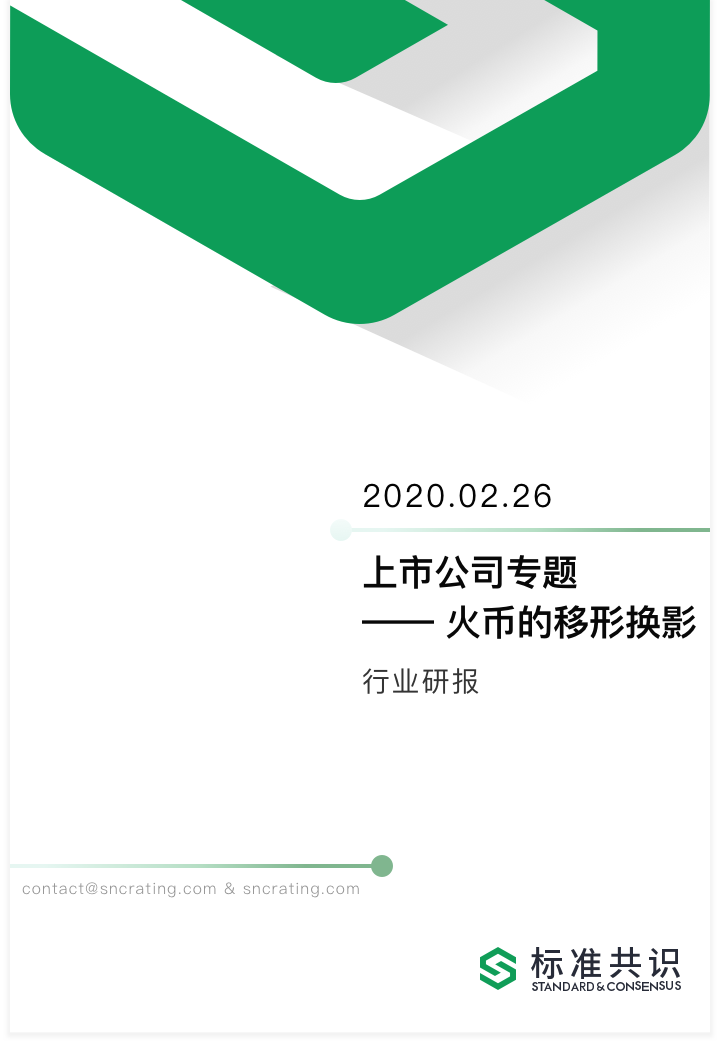
Overview
The purpose of this series is to explore the strategic means and development ideas of blockchain companies from various aspects, and take the pioneers in the industry as examples to further explore the judgment of the future of blockchain.
Report
Huobi Holding Road
Today's story originated on August 21, 2018. On that day, Li Lin and Huobi Group joined forces with former China Development Bank state-owned enterprise cadres, the famous Hong Kong stock market broker Teng Rongsong, to acquire a 71.67% equity interest in Tongcheng Holdings for HK $ 2.72 per share for HK $ 586 million. After the completion of the acquisition, Li Lin's Huobi Global Limited shares accounted for 66.26%, and Teng Rongsong's wholly-owned Trinity Gate Limited shares accounted for 5.41%. The specific number of shares and distribution are shown below. Huobi Global Limited owns 199,295,269 shares and Trinity Gate Limited owns 16,280,731 shares.
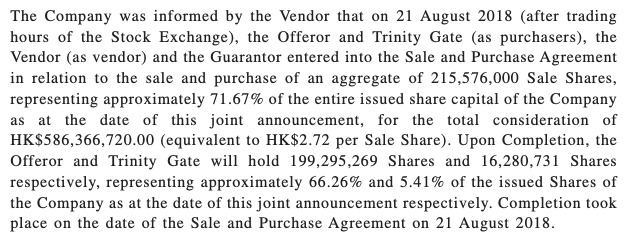
- I could have: The role of the blockchain in the epidemic is called "regret"
- Depth | Application Guide for Blockchain Wars
- Community, DAO, DeFi, this conference changed my view of the crypto world
But this is not the ultimate equity ratio. In addition, Trinity Gate Limited also purchased stocks worth 113.33 million Hong Kong dollars from the purchase of options. Increase his shareholding to 6.69%.


Huobi has not given up seeking absolute control. In less than two years from 2018 to February 20, 2020, the controlling shareholder of Huobi Global Limited, Huobi Universal Inc., increased its stake in Huobi Technology for eight consecutive times, eventually expanding its shares 66.29%.
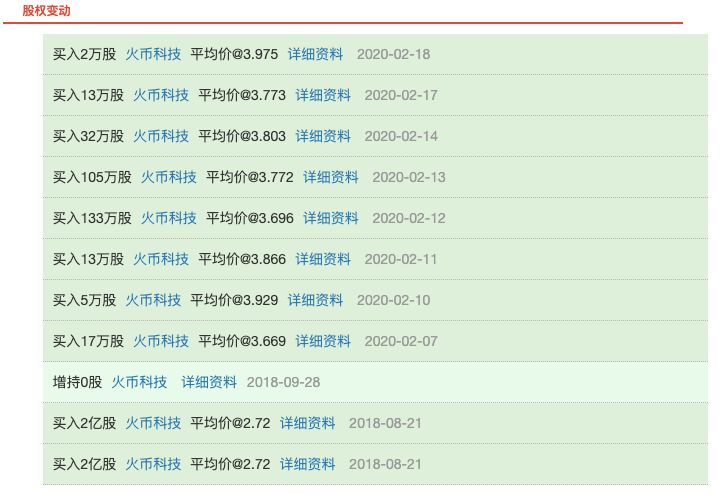
If the repurchase authorization is added, Huobi Global Limited's shareholding can reach 73.65%, and the shareholding will expand from the original 199.3 million shares to 202.5 million shares. And Trinity Gate Limited further increased its holdings to 8.82%. If the repurchase authorization is added, it can reach 9.80%, and its holdings will expand from 16.28 million shares to 26.937 million shares. Taken together, the maximum amount can reach 75.11% without considering the exercise of the 10% share repurchase right (as shown in the figure below), and it is in absolute control. If all the repurchase rights are exercised, the two together add 83.45% of the shares.

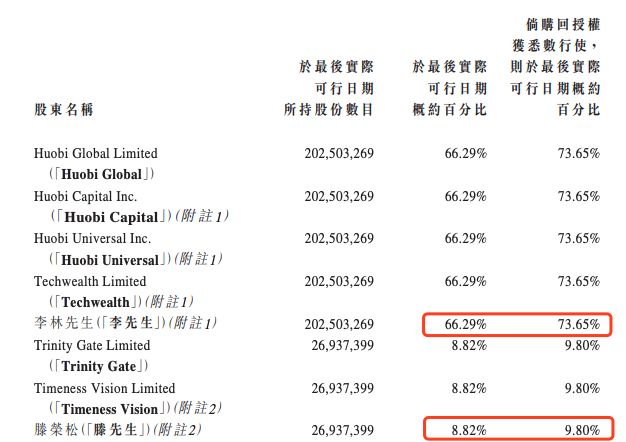
So, why has Huobi been pursuing absolute control over equity, we have made the following guesses:
Take back control
Many listed companies have experienced competition for control, such as the famous Vanke Baoneng battle for equity in 2015. When the shareholding structure of a listed company is too decentralized (for example, there is no single large shareholder with absolute control over the board), such repurchases with the purpose of regaining control will frequently occur. When Baoneng made a large-scale purchase through the open market in 2015, in an attempt to become the controlling shareholder to control Vanke, the management of Vanke announced a 10 billion repurchase plan in an attempt to recover the negotiable instruments in some markets and increase the proportion of controlling shareholders' equity, while increasing Baoneng's acquisition costs have achieved counter-effects. Huobi is continuously acquiring equity, resulting in fewer shares being issued, and potential hostile bidders can reduce the number of shares they can buy from the market. There are not enough stocks to oppose the original major shareholders, which greatly reduces the company's hostile acquisition. The risk guarantees its absolute security.
Improve the efficiency of using funds
When the company's disposable cash flow is much higher than the cash flow required by the company's investment projects, the company can use the rich cash flow to buy back some shares, thereby increasing the level of earnings per share, increasing the return on net assets, and reducing the company's profit indicators pressure. In this sense, share repurchase is also a kind of investment and financial management behavior actively undertaken by the company.
Teng Rongsong
The holding of Huobi has reached today. Trinity Gate Limited, which has been with Huobi Global Limited, has also attracted some of our attention. So who owns this company and what is its intention?
In an interview with Huobi's CFO Li Shubo on December 16, 2019, Golden Finance made the following answers to M & A's starting point and logic regarding Huobi's acquisition of Tongcheng Holdings:
"The first way to obtain the status of a listed company is to apply by yourself, but it will take several years and it is not guaranteed to succeed. The second way is to complete it through mergers and acquisitions. We ultimately chose the latter. "Our friends and partners in the industry, including Xiongan Technology and BC Technology, have also completed mergers and acquisitions through the same form."
The Xiong'an technology mentioned was May 9, 2018. The founder of Xiong'an Fund Yao Yongjie, through the holding of Morgan Hill Holding Limited, and the joint concerted action of Trin Rongsong-controlled Trinity Gate Limited paid a total acquisition of HK $ 900 million for a Hong Kong main board listed company. SHIS Limited (01647.HK) was renamed. And Trinity Gate Limited once again surfaced.
If you trace back along the line of Trinity Gate Limited, it is Timeness Vision Limited. This company holds a number of Hong Kong listed companies including Huobi Technology, Xiongan Technology and IDG Energy, and in the acquisition of several companies, this company including its wholly-owned Trinity Gate Limited is the main acquisition The "consensus" of the company. In other words, the money broker we mentioned earlier. Fully holding Timeness Vision, Teng Rongsong is 100% holding Trinity Gate Limited.

Mr. Teng Rongsong is the current investment director of China Development Bank.
- He worked in the Information Center Network Department of China Development Bank from August 1995 to September 2002;
- From September 2002 to March 2005, he was Deputy Chief of the Comprehensive Division of the Information Center of China Development Bank;
- From March 2005 to October 2005, he was Deputy Secretary of the General Office of China Development Bank;
- From October 2005 to September 2007, he was the general secretary of the General Office of China Development Bank;
- From September 2007 to April 2009, he served as the director of the Second Division of the Fund's Investment Business Bureau of the China Development Bank;
- From April 2009 to September 2009, he was Director of the Market and Pricing Division of the Market and Investment Bureau of the China Development Bank;
- From September 2009 to November 2010, he was the general manager of the first equity of China Development Bank;
- From November 2010 to present, he has been the director of China Development Bank Financial Investment.
In the Xiong'an Technology Acquisition case where he acted as a "consensus", the main company Xiong'an Fund was announced by Yao Yongjie during the launch ceremony of the "China Hangzhou Blockchain Industrial Park" on April 9. Xiong'an Fund has a total scale of RMB 10 billion, of which RMB 3 billion is funded by the Hangzhou Government and has a government background.
On the same day that Yao Yongjie, the founding partner of Xiong'an Fund, acquired SHIS, the Zhejiang Province government held a "Blockchain Technology and Application" seminar for senior government officials. Provincial leaders emphasized the need to implement the General Secretary seriously Regarding the strategic thinking of digital China and the power of the Internet, create conditions to accelerate the in-depth integration of digital technologies such as blockchain, artificial intelligence, cloud computing, and big data with the real economy and social development, and fully implement the "Number One Project" of the digital economy. Build a blockchain industry highland and accelerate the construction of digital Zhejiang. It can be seen that the acquisition may be guided by the Hangzhou government. Whether Mr. Teng Rongsong's role in it is consistent with the role played by Huobi Technology in the acquisition case is unknown. But undoubtedly, the importance of its people in the system can be seen by looking at the leopard in the tube.
Huobi Layout after Holding
When Huobi officially became a listed company, a lot of information previously hidden under the water gradually exposed to our eyes, so what exactly is the layout of Huobi?
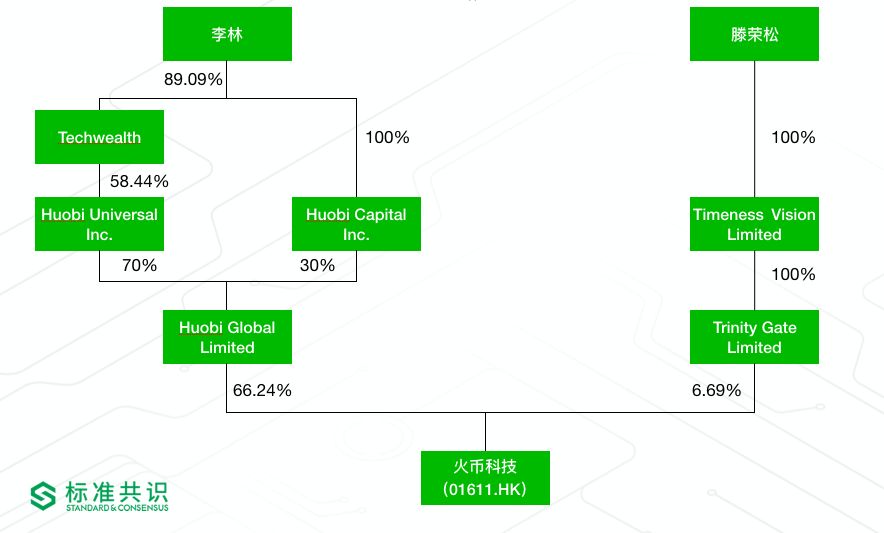
We have previously discussed the right half of the layout. The left half is the actual layout of Huobi. Li Lin firmly controls the actual control of Huobi Group through two offshore companies. Among them, an offshore company named "Huobi Universal Inc.", registered in the Cayman Islands in 2014, is the core holding company of Huobi Group, which holds 70% of the shares of Huobi Group. Li Lin controls Huobi Universal through an offshore company registered in the British Virgin Islands called "Techwealth Limited". Techwealth holds 58.44% of Huobi Universal's consolidated equity, while Li Lin holds 89.09% of Techwealth and is the company's controlling shareholder.
In addition, another 30% of Huobi Group's shares are held by Huobi Capital Inc., a company registered in the Cayman Islands. The company is engaged in blockchain venture capital related business, and Li Lin holds all the shares of the company. Through two offshore companies, Huobi Universal and Huobi Capital, Li Lin became the ultimate controller of Huobi Group, which actually controlled the group, which is Huobi Global Limited's total 66.44% equity.
In addition to Li Lin, the controlling shareholder, Huobi's other small shareholders are mainly divided into two categories. One is a member of the founding team of Huobi. These shareholders, through the offshore company "Techwealth Limited" registered in the British Virgin Islands, hold Huobi Group shares through Huobi Universal.
The other type is venture capital investors who entered in Huobi's financing process. They also hold Huobi Group shares through Huobi Universal. According to ITcoin, these investment institutions include Sequoia China, Zhenge Fund, former express train founder Chen Weixing, Morningside Capital, Shanghai Zendai Investment through Dai Zhikang's cousin Dai Zhigang, and Hong Kong investor Wong Anthony. Among them, Sequoia China, Zhenge and Chen Weixing hold more shares. In particular, Sequoia China is currently the second largest shareholder of Huobi Group.
Change of shape after holding
After completing the acquisition of the shell company Tongcheng Holdings, the company, which was renamed Huobi Technology, conducted two financing activities that had a significant impact on cash flow. The first is on August 21, 2018, as part of the agreement to buy and sell 71.67% of the original Tongcheng Holdings held by Sina Investment Corporation (a company owned by the chairman of the board of directors Mr. Xu Naicheng), Sina Investment will be renamed to Huobi Technology's shell company provides three-year interest-free unsecured loans of HK $ 100 million. The second is on September 26, 2019.Huobi Global Limited and Huobi Technology signed a financing agreement. Huobi Global provided Huobi Technology with HK $ 471 million in interest-free unsecured revolving financing for a period of two years. The agreement clearly states that it will be used as funds for Huobi technology operation and business development. As of September 30, 2019, HK $ 392 million had been received.
Why seek a loan
First of all, on the surface, this behavior of shareholder borrowing is a lack of corporate liquidity, so it seeks shareholder borrowing to supplement working capital. From the perspective of shareholders, of course, it is better to find shareholders to borrow. Generally speaking, if shareholders directly increase capital:
- There is a risk of capital increase due to bankruptcy of the company;
- Involving stamp duty (increased capital will cause changes in paid-in capital and capital reserve balances);
- It is troublesome to go through some change procedures;
- Withdrawal may involve personal income tax.
If a shareholder borrows money, he only needs to sign a loan agreement, which specifies interest-free, does not involve any taxes, and is easy to operate. And the funds can be withdrawn at any time.
Another reason is that direct capital increase by shareholders is very likely to trigger very significant acquisition conditions and be forced to delist.
The Hong Kong Stock Exchange's consultation on backdoor listings, continuous listing guidelines and other amendments to the Listing Rules will end on August 31, with the largest response to the additional requirements for reverse acquisitions proposed by underserved companies. Some market participants believe that nearly 90% of companies with insufficient business may be delisted due to rescue.
The Hong Kong Stock Exchange issued a backdoor listing (reverse takeover action) regulation in 2015: requiring the buyer to become a shareholder with more than 30% of ordinary shares, any indicator of cumulative asset injections is higher than that of the shell company 100% of any of the five test indicators of income, market value, assets, profit, equity, etc., the transaction constitutes a very substantial acquisition (VSA), and the acquisition or transformation of the main business will be considered anti- Acquisitions are treated as if the new shares were listed. The injected assets will go through the approval process equivalent to the listing of a new listed company (a 3-year track record of assets must be provided, which meets the 3-year profit requirements of the Hong Kong Stock Exchange, etc.). The Exchange intends to propose that, in addition to increasing the period from 2 to 3 years, and injecting capital through a series of mergers and acquisitions of "disassembly", it is proposed that within 3 years of rolling calculations, the company's acquisitions and transactions will be considered as A single transaction, considering whether it constitutes a very significant acquisition.
Increasing the capital injection period, in addition to including as many shell capital injection activities as possible, is more important to increase the cost of borrowing, while allowing more disclosure in the process. If Huobi wants to load its existing business into a listed company, it will certainly attract the attention of Hong Kong regulators. The pressure it faces can be imagined, and there may even be the risk of delisting.
From the company's balance sheet in the past three years, we can see a little bit of change.

In the three years from 2017 to 2019, the scale of cash holdings and assets increased rapidly, and the total asset growth rate in 2018-2019 was close to 100%. Of this, 461 million are long-term liabilities.
This information is not enough to constitute any judgement, because the best time to operate is not yet. Until September 2020, the Hong Kong Stock Exchange's capital injection limit for buyers is still suspended above Huobi Technology. However, we can still see some clues about Huobi's future strategic policy from the related party transactions. In Huobi Technology's 2019 annual report, the following related party transaction was recorded.
"On July 19, 2019, Huobi Investment Limited (" Huobi Investment "), a wholly-owned subsidiary of the Group, and Huobi (International) Investment Limited (" Huobi Int'l "), a wholly-owned entity of Mr. Li Lin ) Entered into a sale and purchase agreement to acquire the entire equity interest in Win Techno Inc. (“Win Techno”). Upon completion on July 30, 2019, Win Techno has become a wholly-owned subsidiary of the Group, and Win Techno's financial results have been consolidated into the Group's financial statements (the “Acquisitions”). "
The specific implementation plan for this acquisition is a cash acquisition. The author believes that this is a signal for Huobi to integrate its business, integrating some compliant and painless non-core businesses with the cash obtained from shareholder borrowings into listed companies. While expanding the assets of listed companies, gradually "Leave the sun" on businesses other than those directly related to digital currencies.
At the same time, in an interview with Golden Finance, Li Shubo stated:
"Li Lin recently stated at the Hainan Free Trade Port Digital Economy and Regional International Cooperation Forum that Huobi defines itself as a digital financial technology and operating service provider, and wants to develop a new financial infrastructure solution based on blockchain. Develop related services to the majority of countries with relatively backward financial infrastructure to help their digital financial industries.
To this end, in 2020 we will focus on the two major businesses of Huobi Cloud and Huobi Public Chain. Currently, Huobi Cloud is working with relevant government agencies of the Belt and Road countries to build a digital financial system. The cooperation countries include more than 20 countries on four continents. The Huobi public chain has also been open sourced, and the design of the regulatory node was added at the beginning of the design. It will target the traditional financial industry and national applications, and hope to serve the global market through blockchain technology. "
It is expected that the two major businesses of Huobi Cloud and Huobi Public Chain will be loaded into listed companies as part of responding to support national policies.
Where to go from the exchange
Li Shubo also said in the interview with Golden Finance: "Now, I mainly focus on compliance licenses and listed companies." On November 1, 2018, the Hong Kong Securities Regulatory Commission announced that for the digital currency exchange, the Hong Kong Securities Regulatory Commission It is planned to experimentally monitor related platforms in the sandbox plan. If the experiment is successful, a license will be issued to the cryptocurrency exchange. As a mainstream exchange with compliance requirements, Huobi needs self-evident requirements for compliance licenses. According to the announcement issued by Huobi, the group's cryptocurrency trading-related business is currently headquartered in Singapore. But in fact, the group's legal entity related to the crypto asset trading business is registered in Seychelles, Africa. This information can also be found in Article 7 of the "Legal Statement" provided on the Huobi Exchange website.

The company that owns the global digital asset exchange is called "Huobi Global Limited". This is not a Huobi entity that acquires Tongcheng Holdings, but a company registered in the Cayman Islands. The company name is also "Huobi Global Limited". At present, Huobi does not have the will or ability to install the exchange into the listed company's system.
Therefore, the author concludes that Huobi currently has two main strategies:
1. Transfer Huobi blockchain business to listed companies by expanding assets. 2. Gradually bring digital currency exchanges into compliance by applying for a compliance license.
Conclusion
In the blockchain industry, Huobi is a company that plays a pivotal role in the industry and has made a significant contribution in the development of the industry ecosystem. Therefore, every step it takes represents a new possibility or new direction for the industry. How exactly Huobi will proceed next cannot be judged. How to inject the assets of Huobi Group cannot be judged. It is impossible to judge which Huobi assets are injected into listed companies. When to inject assets, there is no way to tell. However, it can be expected that the two strategies proposed by the author are based on their actual actions, and I hope that a clear logic can be found in the foggy behavior.
risk warning:
- Beware of illegal financial activities under the banner of blockchain and new technologies. The standard consensus firmly resists the use of blockchain for illegal fundraising, online pyramid schemes, ICOs, various variants, and dissemination of bad information.
We will continue to update Blocking; if you have any questions or suggestions, please contact us!
Was this article helpful?
93 out of 132 found this helpful
Related articles
- Perspectives | Issues exposed by the epidemic will become new business opportunities
- France and Austria jointly develop new blockchain forensics tools to help users conduct due diligence
- Video: Insight into the major changes in financial infrastructure in the next 10 years (Part 2)
- As the epidemic is drawing to a close, we have a reflection on the digital system
- Why is the central bank's blockchain patent ranked first in the world's central bank?
- Blockchain Industry Weekly Report | Central Bank Officially Releases "Technical Specifications for Financial Distributed Ledger Security"
- Eighth issue: insight into the major changes in financial infrastructure in the next 10 years (on)


